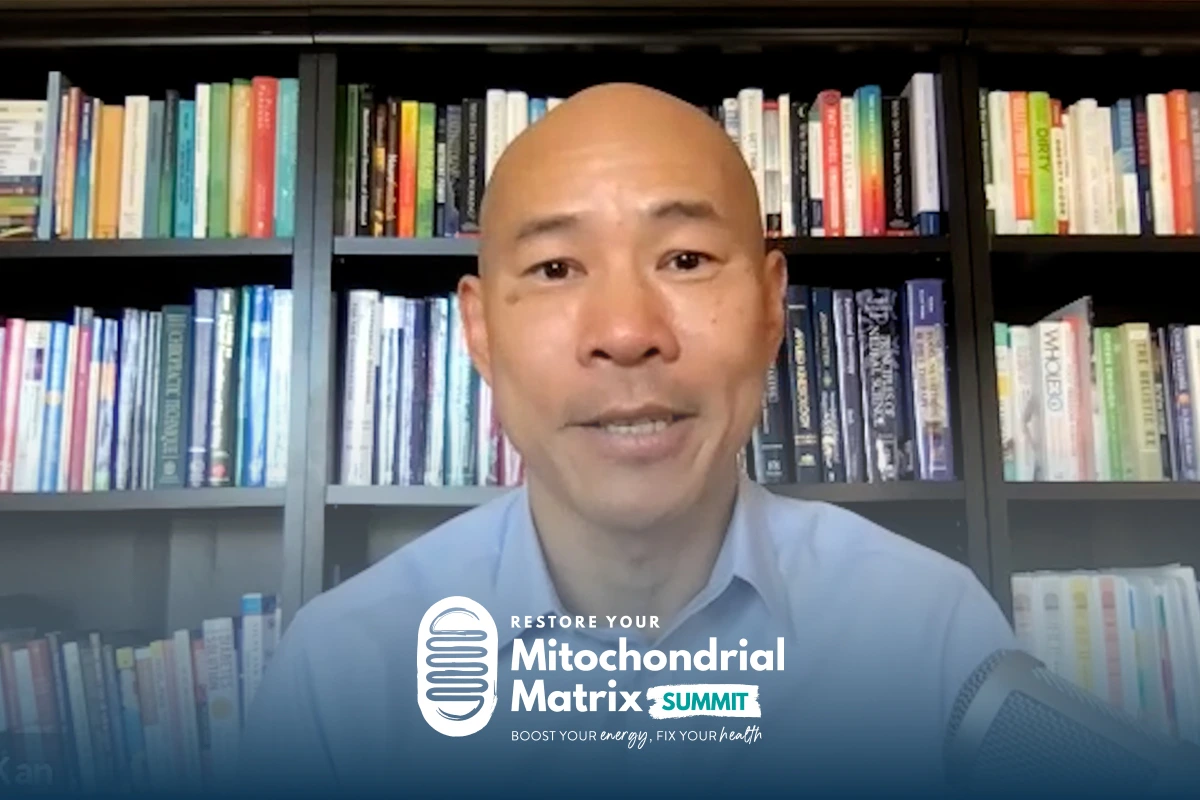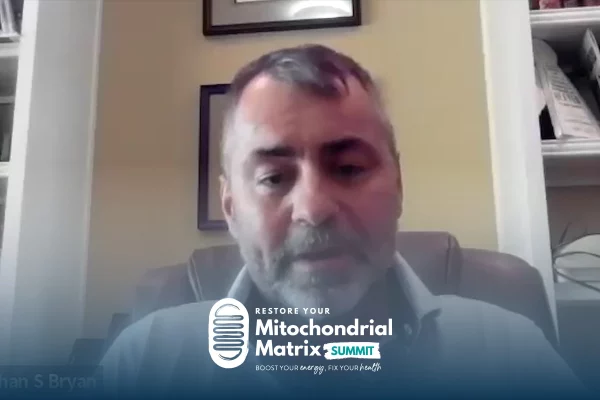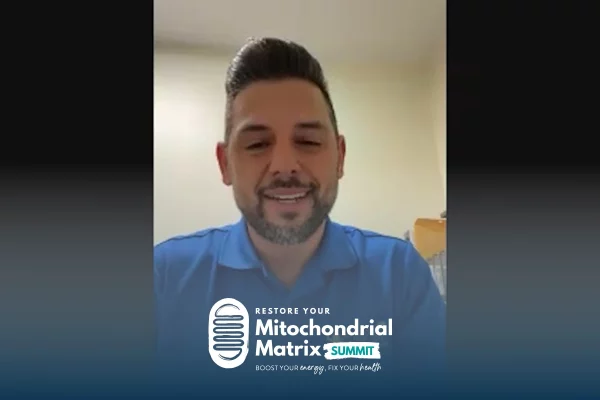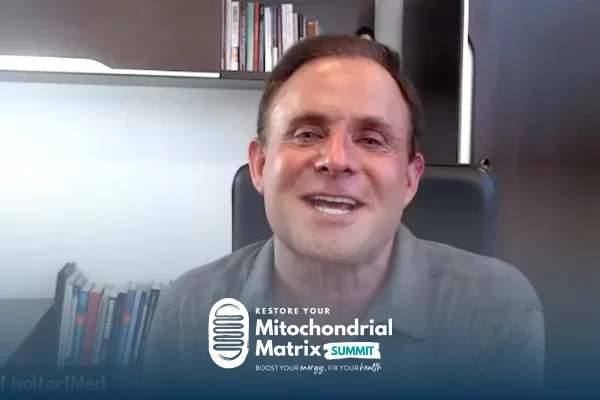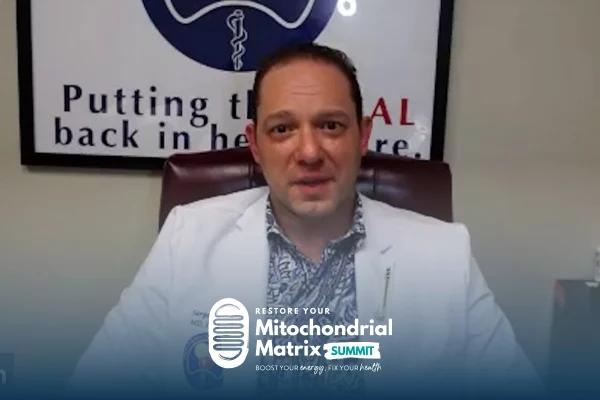Join the discussion below

Laura Frontiero, FNP-BC, has served thousands of patients as a Nurse Practitioner over the last 22 years. Her work in the health industry marries both traditional and functional medicine. Laura’s wellness programs help her high-performing clients boost energy, renew mental focus, feel great in their bodies, and be productive again.... Read More

Peter Kan, DC, DACNB, FAAIM, CFMP, CGP
Dr. Kan supports and manages patients with chronic conditions using a comprehensive approach by merging the exciting advances of functional neurology and functional medicine. Dr. Kan is Board Certified in Integrative Medicine, Functional Medicine, and a Board Certified Chiropractic Neurologist. He is the creator of NeuroMetabolic Integration, a virtual functional... Read More
- Root cause of mitochondrial dysfunction
- How mitochondrial dysfunction impacts brain-immune-gut axis
- Clinical targets to restore mitochondrial function
Laura Frontiero, FNP-BC
Welcome back to another episode of the restore your mitochondrial matrix summit. I’m your host, Laura Frontiero. I’m bringing you experts to help you boost your energy and fix your health so you can build the life you love. And today I have a very special guest for you, Dr. Peter Kan. Hi, Dr. Kan, welcome to the summit.
Dr. Peter Kan
Thank you so much for having me, Laura.
Laura Frontiero, FNP-BC
Yep. I’m so excited. I, you know, we’ve collaborated before years ago, you are the brain, gut, immune guy. We’re gonna talk all about brain, gut and mitochondria today. You support your clients with chronic conditions by merging functional neurology and functional medicine, which puts you in a very unique space. You’re board certified in integrative medicine, functional medicine, board certified chiropractic neurologist. And you’re the creator of neuro metabolic integration. And basically that’s a science based virtual online coaching program. And it identifies the root cause of autoimmune and other chronic conditions. Do I have that right.
Dr. Peter Kan
Absolutely.
Laura Frontiero, FNP-BC
Yeah. Okay, great. Now you’ve worked with a lot of people, well over 5,000 clients and you really are an expert in helping people suffer, who suffer from chronic conditions. So we’re gonna get today about mitochondria, brain, immune, gut. It’s all connected. You can’t ignore one thing. If you wanna heal your body and boost your energy up and fix your health, you really have to dig in here. I think this may be one of the most important talks on this entire summit. So I really wanna thank you for being here and to share your expertise.
Dr. Peter Kan
It’s always a pleasure speaking with you, Laura, and I love to contribute.
Laura Frontiero, FNP-BC
Okay. So shall we jump right in. You, you know, I, I wanna know really quickly, how did you end up, you know, being a neurologist specializing in functional medicine, because that’s a really unique thing because you come from the Western world. So how did that happen.
Dr. Peter Kan
Yeah, actually, I, I come from Taiwan initially in, in a really steep and Eastern medicine philosophy, right. My, my father growing up, I, when I grew up, my father was always like, Hey, eat this because it’s good for your eyes and eat this. It’s good for your liver. You know, that’s kind of how Chinese medicine works, right. You know, food is a diet medicine. And then when I went into, you know, graduate school, chiropractic school, so my, my interest was primarily, you know, helping people with, you know, sports injuries and so forth. And then, you know, as my father and my son gotten sick and there’s a kind of a story in there, I have to figure out how to help them. So that’s kind of how it got me into looking at natural ways and nutrition and supplementation to help them to improve their health and then to overcome certain health conditions. And through my practice, you know, I’ve always been very interested in brain because the brain is how you experience your life, right.
We experience our life through our brain, right. The ability to, to move and our ability to think our ability to experience emotion, it’s all through brain. So brain function is such important part and, and it kind of has its finger into almost every other area. People don’t think so, but your brain touches the immune system and it impacts the immune system. The brain impacts the gut, the brain impacts hormones. The brain impacts a lot of different areas of the body. So by understanding brain, it really helped me to be able to help a lot more people. And when I started mirroring functional neurology, along with functional medicine, that really kind of put a lot of things together, because really there, there there’s this brain you gut connection and that, you know, your, your brain function is hugely tied into metabolics, right. Blood sugar perfusion, which we wanna talk about today, which contribute to mitochondria function. So really, I think my number one purpose now is really to show people how, how big this system is and, and how to really appreciate for what it is instead of trying to go for like, oh, you know, a magic pill, that’ll just, you know, treat one symptom. I wanted people to see the big connection.
Laura Frontiero, FNP-BC
Yeah. This is, this is so critical. So you mentioned, you know, there’s a connection with gut. There’s a connection with immune system. There’s a connection with brain. So we’re gonna dig into that. Can you talk a bit about the root cause of mitochondrial dysfunction. Can we start there.
Dr. Peter Kan
Yeah. And, and I think mitochondrial dysfunction, I see it as a, as a symptom, I see it as a byproduct of other things going wrong, right. Mitochondria is that soluble organ. Now that’s in every, you know, cell in your body that produces ATP that allows you to survive, allows that cells survival in your brain. In fact, you have more mitochondria per neuron than you have, you know, as far as concentration and density of mitochondria in other cells. So the brain is very sensitive to mitochondria dysfunction because brain is very energy dependent. Okay. And so, as far as the, you know, the brain immune gut connection goes, we wanna understand how that impact mitochondria.
So understand that mitochondria is a symptom or the end result of something going wrong. I see mitochondria dysfunction resulting in primarily problem with fuel delivery because for the mitochondria to run, it requires substrate. You need energy source for the mitochondria to produce energy. So mitochondria is the engine, but you gotta put the gas in the engine for it to produce power. So I see fuel delivery problem is one of the primary driver of mitochondria dysfunction. And then on the other hand, I also see inflammation as a, another driver mitochondria dysfunction, because mitochondria can easily be damaged and decoupled in a literature. That’s what is called. They get decoupled. Literally they break apart when they are hit with inflammation. So then that also impacts mitochondria function.
Laura Frontiero, FNP-BC
Let me ask you a question because inflammation is a huge problem. Can you talk about how common inflammation is. Because I, I think people not even sure they have inflammation.
Dr. Peter Kan
Yeah. I mean, I, I think it’s a really important topic. In fact, just a couple of months ago, I literally just had a big immunity master class, a branding master class, just talking about immune function and, and had a big section on inflammation. Let’s define inflammation first. Okay. I think people just think, oh, inflammation is bad, right. It is bad. But on a cellular level, what is inflammation. And I think people think of inflammation as you know, associated with the four Cardinal signs of inflammation, right. The redness, swelling, heat, and pain. Those are signs of inflammation, but what’s causing those signs of inflammation to present. So at the end of the day, inflammation is your immune system trying to get rid of some type of pathogen because that’s the immune system job.
Your immune system is there to protect you from external environment, specifically pathogens. So your immune system have these specific type of white blood cells, such as neutrophils and macrophages and dendritic cells. And these are fatal sites where they’ll go engulf pathogens. That’s the whole entire job is to find pathogens. That’s going to kill you and kill it before it kills you. And, and the process engulfing, these pathogen, they spill enzymes and lysosomes and granules that are contained with these white blood cells. So basically these white blood cells, not only engulf, they also digest these pathogen in the process of doing that. They can spill these enzymes, but these enzymes are really degradating. So in the process, digesting the pathogen, it may also digest your own tissue. So you get tissue damage as a result of that, you get some cellular debris that forms, and really at the end of the day, that’s inflammation.
So inflammation’s not good or bad because it serves the purpose, right. It’s there to kill pathogens, but then you can also get collateral damage. If it hangs on too long, a lot of people have this problem with the inflammation swings all the way to one side, but the pendulum doesn’t swing back to homeostasis. So just stuck in chronic inflammation. And that’s when you get this, this not only tissue damage, but it starts to throw off many other things in the brain immune gut axis. So you start to get leaky gut. You start to get chronic inflammation, which may suppress immune function. So you can’t get rid of infection. You may get brain inflammation that can lead to neuro inflammation, which lead into brain fog, short term memory issue, even degenerative condition. So inflammation is very common.
Laura Frontiero, FNP-BC
Yeah. One more thing I wanna highlight because you’re touching on chronic infection and, you know, people think of infection being something you notice, like you have a fever and you don’t feel good and maybe there’s pain and there, but what we’re dealing with are chronic silent infections by bacteria, parasites, you know, mold, toxins, and Lyme, and all kinds of different infectious things. And, and it’s silent. People don’t necessarily have to show up in a classic. I have an infection profile.
Dr. Peter Kan
Right. They think of the infection. Like I don’t have a fever, so I don’t have an infection. But you can have underlying infections that just don’t quite clear. And so your immune system say in a vigilant state, because you, the immune system knows there’s pathogen there, it’s actually actively trying to get rid of it, but it’s just not able to completely clear it. So you are staying infected while staying persistently inflamed at the same time, remember inflammation’s job is to get it infection. So it’s kinda like, well, if you have inflammation, wouldn’t you just get rid of infection. Well, some people get stuck or they have an infection. They can’t clear and they stay inflamed. So you get both infected inflamed at the same time, which is a bad situation. This is really a situation for a lot of people with chronic conditions. And again, you may not feel it as a fever. You may actually just feel joint pain.
Laura Frontiero, FNP-BC
Yeah.
Dr. Peter Kan
You may feel fatigue because inflammation can decouple the mitochondria. So therefore we have energy issues, muscle endurance issue, muscle pain, as a result of, you know, energy problem with muscular function. So yes, inflammation does, or infection does not show up in what people think.
Laura Frontiero, FNP-BC
Yep. So thank you for unpacking that because you’re making it very easy for people to understand. So now we’ve established, we’ve got these chronic infections that you don’t know are there. You’ve got chronic inflammation. So we know what the root cause of mitochondrial dysfunction is now. So now can you connect mitochondrial dysfunction and how it affects the brain, immune, gut access, cuz that is your superpower is talking about brain immune gut.
Dr. Peter Kan
Yeah, absolutely. Let’s first define the brain immune gut access. So there’s this connection between the brain immune gut. I think a lot of people heard of the brain gut access or the brain gut connection. They know somehow the gut and the brain’s connected there’s explosion of research on microbiome and how that impacts the brain. But I think the immune system is left out of that equation. And, and it’s not that immune immune system’s more important than the brain or the gut. It’s a three way triangle. It’s a big connection. I call it. And so when, when you have dysfunction within the brain immune gut access, when one system fails, the other two goes with it, it’s like a domino effect. This is why when you have gut issues, you start to get brain issue. And when you have gut issue and brain issue, your immune system start to fail. And then you may not be able to fight off infection and you get chronically inflamed, like all the things that we’ve been talking about, that’s the common threat there. Now, how does that tie into mitochondria.
Again, I think that mitochondria dysfunction is a symptom end result of bringing new gut dysfunction, so that it’s more about what’s causing the brain immune gut to fail in the first place, what what’s causing this whole system to not do well. And, and I think this all ties back to really the foundations for, you know, how you de, how you develop someone’s health, right from the foundation, from the ground up. And, and to me, the foundation it is fuel delivery, is your ability to deliver energy and substrate, right. Gasoline, you gotta pump gas into the car. How do you add that gasoline to the car so that your, your mitochondria has something to burn. And this comes down to two primary things, that’s oxygenation and blood glucose, right. And, and in fact, if we’re gonna talk about brain, which is a subject that I love, your brain cells are heavily, heavily dependent on glucose and oxygen for.
So in fact, it’s, it’s two primary requirement is oxygen and glucose. And then there’s a third requirement, which is activation your brain cells have to be activated, right. You have to use your brain cells. So we have to be stimulated in some way. And, but just by the way, by just by living on earth, we have gravitational field that presents a constant stimulation because gravity pulls on your muscles and joints. So you have joint mechanical receptors and prop preceptor that senses this pressure gravitational field. And that literally keeps our brain cells alive by being in gravity. This is why astronauts in space don’t do well, cuz they don’t have gravity. When they come back to earth, they like have to spend a week just learning how to walk. So that’s why they have to exercise in space for like 10 hours a day. Just keep things going. So brain cells have to be stimulated, but it also needs fuel. And that fuel for brain cell is oxygen and glucose. And I would say that fuel is actually very important for the rest of the body as well, not just for the brain. So how does this play out is that if someone has poor oxygen delivery, then that’s gonna impact the mitochondria ability to actually produce ATP. Now, so why would someone have low oxygen.
Laura Frontiero, FNP-BC
Ah, that’s my next question what’s causing that.
Dr. Peter Kan
Yeah. I mean, so this could be caused by, for example, if somebody has anemia. So anemia is defined as having low red blood cell, low hemoglobin, low hematocrit. These are all things that you can measure on a regular complete blood count panel. Just lots of times, people don’t look carefully, but you can see on that panel, whether someone has anemia. Now there’s many different types of anemia because some anemia is due to iron deficiency, but you can have other also B12 deficiency anemia. You can have pernicious anemia, which is auto anemia. You can have anemia of chronic disease. You can have genetic issues like thalassemia and sickle cell anemia.
But know that anemia means that you can’t deliver oxygen and we can’t deliver oxygen. Your, your cell’s gonna suffer because your mitochondria doesn’t have enough to work with to produce ATP. That’s a really common scenario. So people who are having perhaps low stomach acid, then they’re not absorbing the food that they’re eating. They can absorb iron. So they may develop iron deficiency, anemia from simply not absorbing their, the iron that they’re eating. They can have, you know, autoimmune where the immune system’s attacking the parietal cells in the stomach lining and parietal cells produce stomach acid. So if you have autoimmune attacking the cell that produce stomach acid, that you can’t produce enough stomach acid, then therefore you’re not absorbing iron or B12, then that can also produce anemia.
Laura Frontiero, FNP-BC
I just wanna highlight something you just said, because I, you know, lived in the Western world before learning functional medicine for 20 years. And I’m thinking back to all the iron deficiency, anemia people that I treated with iron when, what they really needed was digestive support so that they could actually absorb iron. I just wanna highlight what you just said there, because that’s the solution, the solution isn’t throwing Ferris sulfate at somebody, the solution is fix the GI tract.
Dr. Peter Kan
Or, or find out why they cannot absorb that fair salt because they may have H. pylori, right. So in that case, they, they need to get rid of H. Pylori or they may have just low stomach acid production due to various issues or even due to vagus nerve issue. So they can’t produce stomach acid. So it’s always about asking why, right. Asking the why behind the why.
Laura Frontiero, FNP-BC
Yes. And this is critical for this is just so the audience is clear. This is what makes you so amazing Peter, because this is what functional medicine is. You, you get down to the root cause of solving that problem. So your body can correct itself. And that’s what you do.
Dr. Peter Kan
Right. And this is why I say mitochondria issue is a symptom, not the cause, right. Now, if mitochondria dysfunction itself can cause symptoms. Yes. But what cause the mitochondria dysfunction in the first place. And, and I, and I think we can just ask better questions. We’re gonna get better answers. And to me, fuel delivery is one of those kind of, you know, it’s almost like it’s too easy. You know, people are just like, oh, can’t be anemia. It must be like, I need alpha-lipoic acid. It must be like, I need like, you know, malic acid, some mitochondria or Kreb cycle metabolite. It must be undeficient in that. Well, sometimes it’s just literally you don’t have oxygen, right. So we have to like go for the, the, the, the high percentage play and things that actually happen clinically again, just through experience, you know, is it, is, is it a lot more common for people to be alpha-lipoic acid deficient or is it a lot more common for people to be anemic. I say anemia happens more often than people who are deficient in alpha-lipoic acid. So therefore we should look there first.
Laura Frontiero, FNP-BC
So before we go into blood glucose and the importance there, any more pearls on oxygenation.
Dr. Peter Kan
Absolutely. I mean, another way that oxygenation problem can come is if someone has low blood pressure, right. So people are hypertensive, you know, normal, normal pressure is 120/80. And you have people walking around with blood pressure. That’s, you know, 105/65, 100/60, you know, 90 over, you know 55. Now, just because you have lower pressure, right. A 100/60, it doesn’t automatically make it. So that’s bad. I wanna make that perfectly clear. Cause a lot of time people take this outta contact and say, well, Dr. Kan on say a 100/60 is like the limit for bad. So if I have a 100/60, then automatically I have a profusion problem. Not necessarily because some people a 100/60 is just normal for them. The key thing you share is that, do you have hypotensive symptoms. Meaning, do you get lightheaded, dizzy. You know, you get orthostatic hypotension where you change position, you get dizzy. And then you have like mental endurance problem. You have fatigue associated with, which is a mitochondria issue because you don’t have perfusion. You don’t have pressure to deliver blood to your tissue.
So therefore you can’t get oxygen and glucose into your, to the mitochondria. Therefore you have mitochondria issue. So this hypotension is a big deal, but you have to ask yourself, do you have hypotensive symptoms. So there’s a checklist, checklist that we have, you know, when we help people through this. But if you do have hypotension, then that’s something that needs to be addressed because that can cause you to have deficiency in fuel delivery, not just oxygen, by the way, in the way that you deliver glucose in the way that you deliver any type of nutrient in the way that you remove waste. It all depends on pressure, right. Circulation for that to happen. So I think that’s another thing that’s often missed because in Western allopathic medicine, high blood pressure is, is like the villain, right. It’s the bad guy, you know, obviously high blood pressure is very deadly. It’s something that needs to be, you know, addressed. But low blood pressure is often kind of brushed this side. Oh, your blood pressure’s low. You’ll never have high blood pressure. You’re so good.
Laura Frontiero, FNP-BC
Good for you. Good for you. You’re never gonna have a heart attack. Amazing.
Dr. Peter Kan
While the person feel like crap. And then they’re not told that, you know, that’s probably a little bit too low for you and you’re feeling like crap too. So that may be something we want to address.
Laura Frontiero, FNP-BC
Okay. So should we talk about blood glucose as the next big factor here.
Dr. Peter Kan
Yeah. Glucose is such a common thing in, especially in America, right. And a, and a standard American diet, standard American diet, a blood sugar dysfunction is, is a very common end result of that standard American diet because it’s full of carbs and sugar and hidden sugar and fake sugar. And, and so people are just over consuming those things. And plus you add that to sedentary activity. You’re really creating a, a, a really perfect storm for, for blood sugar dysfunction. And this is why you see so many people that, that are overweight, obese, right. Obesity is one of the number one things in America. Like as far as how many people have obesity, I mean the number just keep going higher, not lower. Despite the awareness of like, I mean, there’s no shortage of podcasts and in some interviews on blood sugar, but there’s still so many people that have weight issue. A lot of it due to just, you know, just not understanding how important blood sugar dysfunction is. Now blood sugar dysfunction comes in, primarily two flavors.
You can that be hypoglycemic or you can be insulin resistant. Although there is a third type where you can be both hypoglycemic and insulin resistant. This is more symptomatically. You can experience lows and highs, right. So on lab or your blood sugar might actually look normal because you have lows and high. So when you average out the lows and high, your blood sugar number looks normal, but your symptom wise, she shows signs of hypoglycemia and also insulin resistance. Now hypoglycemia is bad because then you have low glucose level. And if you don’t have enough glucose, your, your brain cells doesn’t work. Your, your cells, cellular machinery to produce energy is gonna be compromised. Now on the other hand, insulin resistance, just as bad because when you have insulin resistance, you can’t get the glucose into the cell. You have too much sugar stuck in your blood because the insulin’s no longer working. So you have high blood sugar. This is a mechanism for diabetes, but that glucose cannot go into the cell to be useful energy.
So your mitochondria are starving for energy. And this is why people experience right. Hypoglycemic symptom is what fatigue, brain fog, anxiety, shaky, lightheadedness, right. Hangry. I mean, Hangry is a brain symptom. Hangry is not like your bicep or your muscle. Hangry is a brain symptom. This is why when you have low blood sugar, that’s the perfect example, how your brain is so sensitive at glucose level. So, so take heat in that, right. You want to take steps to stabilize your blood sugar. It’s such a low hanging fruit and easy thing for most people to, to actually fix it. Because a very lifestyle modifiable, there’s certainly mechanism for blood sugar dysfunction that may be more complicated. People may have autoimmune, right type one diabetes. They have may, may have autoimmune to specific enzyme like glutamic acid dicarboxylic, gas 65 enzyme that can make it diff, more difficult for them to process blood sugar. There may be other mechanisms for why they have blood sugar issue, but more common, more commonly for majority of the people is something that can fix through diet, exercise, and, and managing stress actually also.
Laura Frontiero, FNP-BC
Yeah. Yeah. So we’re gonna talk about how to restore mitochondrial function and real quick, can you just touch anything else you wanna say about immune system and mitochondrial function. I mean, we talked about inflammation. We talked about gut. We talked about these problems, oxygenation, blood glucose levels being too low. What about the immune system.
Dr. Peter Kan
Yeah, I, I mean, the immune system is important here because remember mitochondria are, they’re sensitive to damage. They’re sensitive to inflammatory influences. And so when your immune system gets tipped toward an inflammatory state, remember inflammation is not a switch. It’s not like you’re either inflamed or you’re not right. There’s many degrees that your body has different gradients and inflammation. You can go from not inflamed at all to like mildly inflamed to moderately, to very inflamed. So, and it could shift back and forth a dynamic situation. So, you know, it’s not like you’re inflamed or you’re not. It’s like, how inflamed are you. And, and how does that correlate with other things that’s going on in your body. Like, do you have infection going on at the same time. Do you have leaky gut going on at the same time. Because these things all can skew that degree, that inflammation to certain degree, or make that inflammation more resistant or harder to fix if you have certain issues.
Okay. But to be sure inflammation’s gonna cause mitochondria issues, then therefore you get energy issue. This is why people, a lot of time, they maybe the blood sugar is just fine and they don’t have blood pressure problem. They yet, they’re still tired because they’re just simply inflamed. And one, the ways that can cause this energy issue is due to the disruption in mitochondria, although inflammation can also block thyroid hormone function. So then you get thyroid hormone resistance. Inflammation can also create, you know, cortisol problems. So you’re releasing too much cortisol. Then you get cortisol resistance. So that can also cause fatigue. So there’s a lot of ways that inflammation can cause fatigue. So I don’t wanna just say it’s all about the mitochondria, but certainly it can damage the mitochondria as well. And, and again, I wanna point to people to the, the, the fact that let’s just make it practical for them. If you have blood sugar dysfunction, you’re gonna tip your inflammation more to the inflammatory scale. If you have leaky gut, your gut barrier is like a factory for inflammation. Remember when I, when we say inflammation, I think people should right away. Think about inflammation. It’s how your immune system kill infections.
That’s what it is. So inflammation’s not bad. So why is the gut lining a factory for inflammation. Because that’s where you put food in your mouth, right. It’s the place where your gut meets the external world and the food that you eat. So it’s, it is lined with inflammation because it’s there to kill infection that you might put in your mouth there’s is purpose for it. But because it’s a factory for inflammation, if you’re putting way too much processed food and, or food that you’re sensitive to, or you get dysbiotic, then this factory turn out way too much inflammatory chemicals. And that’s going to have a degradating effect because when you have way too much inflammation, you tend to sort of shut down your immune system ability to fight off infection. Like it’s almost like too much of a good thing, your, your inflammation supposed to kill off infection, but when you have too much, it actually suppresses certain populations or immune cells that are there to kill immune, kill pathogens. They get suppressed in the presence of way too much inflammation. So then you get this imbalance and people start to get chronically infected and chronically inflamed at the same time, which is so in the mood.
Laura Frontiero, FNP-BC
Yeah. So what I have a feeling you’re gonna say is, as we transition into talking about restoring mitochondrial function, it matters what you put in your mouth, because as you just said, your gut is there to kill off infection or anything that’s coming in from the food. So let’s talk about how do we restore this. How do we fix this. I have a feeling. Food is a big one.
Dr. Peter Kan
Absolutely food is big. It is, it is one mechanism. And, but what, what we want to really think about it is more in a big way, right. Call the big for me, you know, stands also for brain immune gut. I call it a big idea or a big connection. We wanna think in terms of how do we resort brain immune gut function by using a roadmap. And roadmap, this neuro metabolic roadmap is something that I developed through just clinical research. And just years of experience finally comes through realization that you have to address these chronic conditions step by step. You cannot just go in and guns blazing and throw the whole kitchen sink at it and everything else at it, you know, taking 50 supplements or a 100 supplement is not the solution to the problem. Prioritizing and sequencing this reset is the way to get the best result, because then you you’re clear on what step that you’re working on. So you’re not like jumping on something that’s like chasing shiny object syndrome.
So just to give you an example, Laura, the first two steps is what we already talked about. Oxygen, oxygenation and blood sugar stability, right. Because without those, your mitochondria is gonna suffer. And so is everything else. So by fixing that, you’re gonna impact a lot of things like where do you have mitochondria, like every cell in your body. So by doing, by improving blood sugar stability and improving oxygenation, you’re improving potentially the function of every single cell in body. It’s gonna have a huge impact where if you like, you know, take a probiotic, is that necessary gonna impact in mitochondria in a, in a, as a large, a degree as addressing oxygenation, if you have a problem with that or blood sugar problem, probably not as much, right. Taking hydrochloric acid to support you. You know, a gastric asset status is important, but it, it’s not gonna have as big of impact on mitochondria as blood sugar stability and oxygenation. So again, if we can take it a step by step approach, a prioritized sequence approach, I think people are gonna do a lot better. So, so that comes down to, yes, the food that you eat, right. So you can eat in a way that does not promote insulin resistance. You can eat in a way to help you, if you have hypoglycemia.
So people with hypoglycemia can eat small frequent meals, right. In the beginning, you know, always the goal is that you shouldn’t have to eat small frequent meals just to like survive for the rest of your life. You’re eating small frequent meal. If you have symptom of hypoglycemia. So you’re maintaining your fuel stability until you get better. And you address the underlying reason for why you even have hypoglycemia in the first, first place, which may be lifestyle, which may be stress, which may be inflammation, maybe adrenals. So, right. It’s always a lot asking the why of the why, of the why. But once you get the blood sugar stability handle, then you may be able to go to where you’re not eating as frequently because you know, I know a lot of people’s like I thought fasting is good. Fasting is good, but you know, you can’t like the, the plan is not to like never eat, right. Like, What if you just don’t yeah. Just eat nothing for 30 days. Like that’s not a plan, right. It’s not sustainable. You gotta eat.
Laura Frontiero, FNP-BC
You can’t fast out of the gates. If you have hypoglycemia. I, I was laughing earlier in my head when you were talking about hangry, because I was always known in my family and in my closest friends, as you better feed her because she gets hangry. So I had major, you know, fluctuations in my blood glucose levels. And I always had this underlying kind of I’m thin and active, but I had a higher hemoglobin A1C and, and it was always like an anomaly, like, how’s that possible because I’m thin, right. But I had, you know, dysregulated blood sugar anyway, there was no way I could ever have intermittent fasted or fasted. I would’ve killed somebody if you told me to fast. And now that all of that is cleared up and I’m, I can go, I can fast every day. In fact, I’m fasting right now while we’re talk, while we’re shooting this interview, I won’t eat for another, you know, four hours till about noon, one o’clock and I can do it now. So anyways side, just a side thing you can.
Dr. Peter Kan
That’s actually really a important thing that you mentioned Laura, because this goes back to, you know, summits. Great. We’re giving people a lot of information, but I think people have to learn to exercise, discernment and wisdom. So they’re taking the information and say, okay, does that fit me. I think talking about people, they, they go on, oh, fasting summit. Fasting is good for everyone. And while this person’s hypoglycemic and they’re trying to fast because they heard fasting is good for you. Well, it’s probably not good for you at this moment in time. You gotta fix that first to get to the point where you could fast. So the fact that you could fast now, Laura means that you’re you’re healthier, right. You got to the point.
You can’t do it. Yeah. It’s all about just making sure that you’re, you know, using this information correctly to fit your specific circumstance. I think the biggest takeaway that I can give to people is that you want to have more nuanced approach, right. So as you listen to the mitochondria summit, this summit, all these great speakers you want to pay attention to, okay, this is fit my specific situation. You take the information in right, putting your database and, and buy the recordings, but see if the, in how the information fits you. You know, a lot of my education is teaching people how to do assessments to understand, okay, if you have this pattern, that means you go that direction. If you have this pattern, you go that direction. So you’re not taking the same thing, cookie cutter for everything, you know, like that might be right for somebody else, but not right for you.
Laura Frontiero, FNP-BC
Yeah. And so I’m so glad we went down that little side note because there’s so much information coming at people from summit. So thank you for, for sharing that, you know, you really have to take what makes sense and leave what doesn’t for now. You can always come back to it later. So, all right. So what else do we need to do to focus on restoring mitochondrial function, you’ve talked about your big, I love that the brain immune gut big plan, we’ve talked about oxygenation and blood glucose is foundational to healing this. Where else would you go. What other pearls would you give.
Dr. Peter Kan
Well, another, you know, it’s not a side, but you know, when we talk about the roadmap, you know, the roadmap that I use, you know, it’s oxygenation, blood glucose, and then it’s digestion, right. Because if you can’t digest your food, then you’re not going to extract nutrient from your food. And if you can’t extract nutrient from your food, then it doesn’t really matter what you’re put in your mouth. You’re not extracting the nutrient from the food anyway. So I see digestion and absorption as the next foundation. That’s where the gut, you know, aspect of it come in, of course, digestion, there’s many parts to it. You know, there’s, there’s vagus nerve. There’s just the mastication. And then there’s the stomach acid. There’s pancreatic enzyme. There’s bile. There’s intestinal permeability. So there’s a lot of parts to it, probably beyond, you know, what we’re gonna talk about. But I think just for people to understand that digestion’s really important, really think about how to optimize your digestion. I think an easy way to optimize digestion, really make sure they’re eating in a non-stressed, you know, situation, right.
Because when you’re stress eating, then your vagus nerve is really not functioning as well. So you’re not priming the digestive pump. You wanna make sure you’re chewing your food. So because that, that actual, the act of chewing slowly, you know, 40 bites before you swallow actually activate prop receptors in your TMJ. And that actually has an effect on stimulating vagus nerve as well. So, so you want to eat, you’ll want to inhale your food in a hurry on the run, right. That that alone will help with digestion. Certainly a lot of people have hypochlorhydria then, you know, this is where using, you know, putting hydrochloric acid or apple cider vinegar to acidify the stomach pH can be very helpful. So that’s just some quick things to do just in a very top part of the digestion. There’s certainly other things we’re gonna do down below, but you always gotta start from the top, right. When it comes to digestion, you start from north to south, you gotta start on very top brain, stress, vagus nerve chewing, stomach acid, and then work our way down.
Laura Frontiero, FNP-BC
Oh. That I love that analogy. That makes so much sense.
Dr. Peter Kan
It makes, it makes too much sense. It’s a fault of mine.
Laura Frontiero, FNP-BC
That’s a good thing. That’s a good thing. All right. Any other pearls on restoring mitochondrial function. Anything else you’d like to share.
Dr. Peter Kan
Yeah. And lastly, I, I certainly, we don’t wanna leave out exercise, right. Because we, we talk a lot about, you know, food and diet and yes, then stabilizing blood sugar, you know, eating more protein and less carby things, less sugary thing. That’s gonna have a high glycemic index or spike your blood sugar. Those are all important, right. Eating your vegetable feed of gut microbiome, all important, but it’s not just about what you eat. It’s also how you move. So mitochondria really responds well to exercise. And of course, within exercise, there’s a lot to talk about, right. Because we have the aerobic exercise and we have, you know, the high intensity type of exercise. We have strength training. So there’s many different type of exercise in general, though, for mitochondria, the aerobic part is probably the most important. It doesn’t mean that strength training and high intensity stuff is not important. They’re all important. You should be doing all of em in a, in a regimen, in a programmed way. Right. But the aerobic part is probably, what’s very underlooked for most people. They’re either not doing enough. So they’re not getting a benefit from their exercise or they’re doing too much where they’re actually doing anaerobic and it’s not aerobic at all. For example, a spin class is not aerobic, is completely anaerobic.
So it’s a cardiovascular exercise. Well, it is the cardiovascular exercise is an exercise. It’s any exercise that raises your heart rate. So if you can do a hundred yard dash, that’s cardiovascular, your heart rate’s going up and even doing strength training, you know, like your heart rate will go up while you’re doing the set that’s, that’s kind of has some cardio, you know, vascular effect, but that’s not a aerobic, whether it’s aerobic or anaerobic is describing the energy system that you’re using aerobic activity in a true aerobic zone actually is what drives your mitochondria to help you do, you know, burn fatty acid using oxygenation. And that has a tremendous amount of benefit. So I just wanna point people to, you know, exercise, right. And, and all you have to do for the aerobic stuff. Just go off for walk, but you have to walk in a certain intensity to make sure you’re in a true aerobic zone.
Laura Frontiero, FNP-BC
Yeah, yeah. Not a leisure walk.
Dr. Peter Kan
Right. You gotta get your heart rate up. You gotta, you know, be able to maintain a conversation while you’re still breathing hard. So if you are working too hard, you can’t even, you know, speak, then it’s too hard, high intensity. If you’re just strolling and your heart rate is not even moving up, then that’s probably too easy. So there’s, you can use a perceived, rate of perceived exertion, the breath test to give you intensity, or it can use a heart rate monitor and measuring.
Laura Frontiero, FNP-BC
This has been so good. This has been so good. Dr. Kan, thank you so much. I wanna make sure everybody knows how to get ahold of you, where to find you, how to, how to be a part of your big roadmap plan. Where can we.
Dr. Peter Kan
Yeah. Thank you for that. Yeah. I’m, I actually have a lot of just free content on YouTube. So you can just go to YouTube and type in Peter Kan DC, just my name, DC, the DC at the end. And there’s like over 400 videos on my YouTube channel as very highly watched. So I think that’s a great free resource for people. If you like more of this type of content, my website is askdrkan.com and then our master reply is, you know, bigmasterclass.com, but Laura will be helping us to promote that. So we we’ll send Laura. I’m sure it’s gonna send the links, you know, to her, to our audience later at a later time.
Laura Frontiero, FNP-BC
Absolutely. Absolutely. Thank you so much for breaking this down. It’s always such a pleasure to have you speak on brain, gut and immunity, and to really bring in mitochondria and connect all of that in a way that’s easy to understand. That’s the key, making it simple for people, cuz if it’s not simple, it’s gonna go in one ear and out the other. So you break it down. So simply.
Dr. Peter Kan
Thank you so much. It’s always a pleasure and I hope people, people get a lot of, you know, practical use and really take it to heart. You know, some of these things are really actionable. Go and do it today.
Laura Frontiero, FNP-BC
Thank you, Peter. Take good care now. Bye.
Dr. Peter Kan
Thank you.
Downloads

